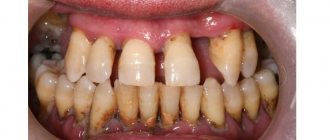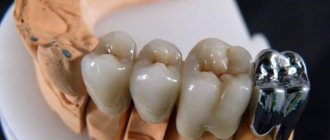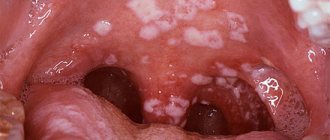What does bitterness in the mouth mean after eating or in the morning: causes and treatment
Bitterness in the mouth is a fairly widespread phenomenon, many people are familiar with it. This is especially true for those who suffer from pathologies associated with the gallbladder, liver, bile ducts, and organs of the digestive system. Why does this symptom occur?
The causes of altered taste are often spicy, fatty, spicy foods, and medications used over a certain period of time. A person suffering from congenital problems with the bile ducts also “puts up” with the taste of bitterness. Constant bitterness in the mouth (and not only after eating) indicates the presence of a serious disease that requires correct diagnosis and adequate treatment.
Bitterness in the mouth - what does it mean?
The main cause of a bitter taste in the mouth is the reflux of bile into the esophagus, which occurs when the liver, gallbladder and biliary tract are not functioning properly. Bile is a digestive fluid that is produced by liver cells and accumulates in the bladder. Here it is not only stored, but also “ripens” and acquires a full acid-salt composition. After “ripening,” the bile enters the duodenum, where it initiates the digestion process.
Bile secretion has a characteristic bitter taste. Healthy mature bile has a certain composition. In addition to acids and metal salts (sodium and potassium), the secretion contains proteins, phospholipids (fats for building cell membranes), cholesterol, chlorine and calcium ions. An unbalanced composition of bile leads to the precipitation of salts. This is how clots, flakes, sand and stones form in the gallbladder. They impede the outflow of secretions, forming stagnation in the bladder and ducts. In addition, the cause of stagnation is often a spasm that accompanies stress and nervous experiences (fear, hostility, anger, hatred).
Against the background of stagnation, the release of new bile continues, which tends to enter the bladder. The human liver secretes up to 1 liter of bile secretion per day. This creates pressure, which forcefully pushes the stagnant secretion, throwing it into the stomach and esophagus.
When and how often does the bitter taste occur?
From when bitterness appears in the mouth, we can guess what causes this symptom:
- During physical activity, if it is also accompanied by heaviness in the right side, it may be a sign of liver disease.
- In the morning - the reason most likely lies in problems with the liver and gall bladder.
- Only after eating too heavy, fatty foods, after overeating - diseases of the gallbladder, bile ducts, liver.
- Bitterness appears after any meal - diseases of the stomach, duodenum, gall bladder, and some liver pathologies.
- Short-term bitterness in the mouth - during a stressful situation or the use of medications that affect the liver and gastrointestinal tract.
- Constant bitterness in the mouth - a possible cause is cancer of the gastrointestinal tract, cholelithiasis, cholecystitis, endocrine or mental illness.
Appears after eating cedar
After eating pine nuts, even a completely healthy person may experience bitterness in the mouth. Usually this phenomenon is mistakenly attributed to the choleretic properties of the product, but such a reaction cannot occur with high-quality pine nuts.
Meanwhile, bitterness in the mouth appears immediately after eating and lasts for several days; sometimes other symptoms of intoxication may appear - nausea and pain in the liver area. All this clearly indicates that the pine nuts were artificially grown and imported from China. Many suppliers pass off Chinese nuts as domestic products, since they are cheaper to purchase. But there are many reasons why it is better to refuse such a food product.
Treatment approach
In order to eliminate the smell of chlorine from the mouth, it is necessary to find out the cause of its appearance. With the help of various tests and studies, deviations from the norm can be identified and the disease can be determined. Treatment should be comprehensive and depend on the reason for the smell.
Along with the main therapy, additional methods of eliminating a specific aroma should be used:
- Stimulating salivation . Abundant saliva is released when chewing parsley, mint, dill and cloves. You can use sugar-free lollipops and mints to prevent tooth decay.
- Drink plenty of fluids . When there is a lack of water, the body produces insufficient saliva. As a result, not all bacteria in the mouth are dissolved and washed away, resulting in an unpleasant odor.
- Mouth rinse . You can use ready-made rinses or prepare a decoction of herbs that have antimicrobial, anti-inflammatory and refreshing effects. Herbs such as chamomile, calendula, and sage are perfect. One tablespoon of raw material should be poured with boiling water (500 ml) and left for one hour. Rinse your mouth with warm infusion.
- Application of sorbents . Activated carbon or atoxil will help reduce intoxication of the body.
For hokinsinuria, along with therapy, it is necessary to adhere to a special diet that practically excludes protein from the diet. You should also reduce your intake of foods containing phenylalanine and tyrosine.
To prevent chlorine odor, preventive measures should be followed:
- daily cleaning of the tongue from plaque;
- regular visits to the dentist;
- active lifestyle;
- timely and high-quality treatment of emerging diseases;
- rejection of bad habits;
- compliance with safety measures when working with chloride substances;
- daily brushing of teeth with high-quality toothpastes;
- proper nutrition;
- drinking quality drinking water;
- inclusion of a large amount of fresh fruits and vegetables in the diet;
- consumption of a complex of vitamins.
The main causes of bitterness
What does bitterness in the mouth indicate? There are actually a lot of reasons why a person begins to feel this. In this way, the body may try to “indicate” diseases of the digestive system or a gallbladder disease. This sensation may also be a sign of poor nutrition or taking medications of various spectrums for too long (mainly those used to treat the liver).
The main causes are diseases of the gastrointestinal tract (GIT):
- Diseases of the duodenum. Bile from the duodenum, entering the stomach, causes corrosion of its walls. Bile contains acids that cause a feeling of bitterness.
- Gastritis (see symptoms and treatment of gastritis). With this disease, the composition and amount of gastric juice produced by the body changes, the process is also accompanied by poor digestibility of proteins, fats, carbohydrates and other vitamins, and the removal of toxins worsens. Together, this causes heartburn, bad breath, constant belching and, accordingly, an unpleasant taste in the mouth.
- Gastric dyspepsia. The cause of the bitter taste may be difficult digestion caused by disruptions in the functioning of the stomach.
- Gastroesophageal reflux disease. This disease provokes surges of concentrated gastric juice to the very top of the esophagus, from where it enters the oral cavity. It can develop due to the abuse of spicy and fatty foods, as well as constant overeating (even healthy food rich in vitamins and minerals - an excess of it is also harmful).
- Disturbances in motor activity of the stomach. With reduced motility of the biliary tract, bile stagnates in them; with increased motility, there are sharp releases of bile into the duodenum, then into the stomach, esophagus and oral cavity, causing bitterness, burning and heartburn.
- Dysbacteriosis. Under normal conditions, a large number of beneficial bacteria live and function in the human intestine, capable of synthesizing vitamins, creating microflora and generally increasing the body’s immune strength. If the intestinal microflora is normal, then no problems are observed, but if an imbalance occurs, then dysbacteriosis appears, causing bitterness in the mouth.
- Giardiasis. A disease caused by the penetration of Giardia (intestinal parasites) into the body, causing disorders in the functioning of the small intestine. Nausea, bitterness occurs, and sleep is disturbed.
Dental diseases:
- Inflammation of the gums, mucous membrane of the tongue. This occurs if a person carelessly takes care of their teeth, and bad breath adds to the bitterness.
- Increased sensitivity to external interventions - implantation of dental crowns, dentures or fillings. The bitter taste is often caused by raw materials for dentures, fillings or gel for fixing an artificial jaw.
Other reasons include:
- If there is liver dysfunction (any disease), then increasing inflammatory processes negatively affect the production of bile and its transportation through the relevant systems of the body.
- Nervous system disorders, in which the peripheral nerves responsible for the taste buds and sense of smell become inflamed, also alter the perception of the taste of food and make it bitter.
- At moments when the level of glucose in the blood rises, vision begins to deteriorate, a feeling of weakness and heat appears in the palms and soles, along with this, a bitter taste becomes very noticeable in the mouth.
- General intoxication of the body, which is observed when it is damaged by heavy metals such as mercury, lead, copper and others.
- Disturbances in the functioning of the endocrine system lead to the fact that the thyroid gland, together with the adrenal glands, begins to produce huge amounts of adrenaline. As a result of this, the bile ducts narrow, which provokes the release of bile towards the esophagus and the appearance of bitterness.
- Lack of zinc - an important trace element that is necessary for the normal functioning of cells and taste buds in particular.
- Smoking for many years. Long-term exposure to tobacco and its derivatives has a detrimental effect on the taste buds, as a result of which the smoker begins to feel an unpleasant bitterness.
Haunting sweetness
The sweetness that spreads in your mouth from just eating a cake is a very pleasant sensation. But, if a person’s saliva continues to be sugary, even after herring, even after jellied meat with horseradish, it’s worth thinking about. The reasons for the appearance of a constant sweetish taste in the mouth may be:
poisoning with chemicals (for example, pesticides or phosgene) - if, in addition to a sweet taste, a person feels weak and unwell and understands that he may have had contact with poisons, he should immediately consult a doctor;
changes in carbohydrate metabolism in the body and impaired insulin production - with a lack of insulin in the blood, sugar accumulates in the blood and lymphatic fluid, penetrates into saliva and it becomes sweet. Therefore, the first thing you should do when a persistent sweet taste appears is to contact an endocrinologist and donate blood for sugar. This is how diabetes mellitus can manifest itself. A sweet and sour taste in the mouth, especially in the morning, also accompanied by frequent heartburn, often occurs with problems with the pancreas, in particular with pancreatitis;
nerve damage, including infectious and viral - take a general blood test;
stress, depression - when a person’s life is unsweetened, stress hormones begin to actively work in his body, which lead to an increase in blood glucose levels. In this case, the taste appears briefly immediately after psycho-emotional shocks;
respiratory tract infections and some dental diseases caused by Pseudomonas aeruginosa - these bacteria are capable of secreting sweet substances;
smoking – or rather, a recent cessation of this habit.
Causes of bitterness in the mouth while eating
Sometimes you feel a bitter taste in your mouth while eating. When this phenomenon is one-time in nature, the cause may be the type and method of cooking.
But what to do if the bitterness in the mouth becomes chronic? First, you should consult a doctor. He will be able to determine what disease such a symptom relates to and then prescribe treatment. The main causes of bitterness in the mouth while eating are:
- Cholecystitis is an inflammatory process in the gallbladder, which is accompanied by painful sensations in the side, dry mucous membranes, and high body temperature.
- Dysfunction of internal organs. Diseases of the digestive organs, liver, kidneys, gall bladder.
- Poor nutrition. It is not recommended to eat fatty, fried, spicy, salty foods, soda, and fast food. As a result of their consumption, a feeling of bitterness may occur.
- Acid reflux, vomiting aftertaste. The cause of bitterness is gastric juice, which from the stomach begins to rise through the esophagus to the oral cavity.
- Disturbance of taste buds. The receptors that are responsible for the perception and recognition of taste stop working. All products that a person consumes do not differ in taste for him. This occurs due to excess amounts of phenylthiocabamide in the body.
- Hormonal changes in the body during pregnancy.
- Dental diseases of the teeth, gums, the body’s reaction to a filling or crown.
- Violation of acid-base balance. Accompanied by lethargy, muscle fatigue, joint pain.
If such a symptom appears after eating, it is recommended to adhere to the rules of a healthy diet. Avoid eating fatty, fried, salty, bitter, sour foods, soda, sweets, and baked goods. It is advisable not to convey that food should be easily processed and absorbed by the body.
I'm sad, I'm sad. How to relieve this “bitter feeling”?
We can say that bitterness is a fairly understandable and well-known taste. In most cases, this can be a signal from your stomach or gallbladder, especially after a rich feast. But this does not mean that you should limit yourself only to traditional medicine recipes or medicinal herbs.
It is necessary, first of all, to adjust the diet. To do this, you should exclude fried, spicy, sour, spicy, and fatty foods. It is recommended to increase the frequency and volume of drinking water consumed, supplementing it with green tea. One of the mandatory rules is maintaining oral hygiene, including rinsing your mouth after eating. If such sensations appear regularly, it is recommended that you immediately go to see a gastroenterologist.
Food poisoning and bitter saliva
Foodborne toxic infection is very often accompanied by a taste of bile due to general toxicosis of the body and malfunctions of the digestive system. This includes vomiting bile and bile reflux. Often, after poisoning, a person temporarily lacks appetite. Food does not enter the stomach, and bile, despite this, is produced by the liver around the clock. It stagnates and some of it is thrown into the stomach and esophagus.
It takes time to normalize the functioning of the digestive tract after the symptoms of poisoning disappear. Then the unpleasant taste sensations will pass.
Tip #1: Pay attention to what you eat.
If the taste of acetone appears in your mouth, then it most likely signals a problem in the body. But often pathology can be caused by your lifestyle and diet. For example, the taste of acetone in the mouth (as well as iron, for example) can arise for reasons that are quite harmless at first glance, both in men and women.
So, let's look at how dietary habits and unpleasant phenomena are related:
- you eat predominantly protein foods: often athletes, bodybuilders or those people who want to build muscle mass have a diet dominated by proteins, but they do not care at all about the presence of carbohydrate foods. However, it is carbohydrates that are also responsible for normal metabolism, and in their absence, the protein component does not decompose completely, which produces the production of substances called ketones or ketone bodies (essentially these are elements of acetone and acetoacetic acid). These substances are formed in the liver, then gradually spread through the bloodstream throughout the body and are excreted along with urine, and a person develops a disease such as ketonuria,
The predominance of protein foods in the body can cause this effect. - you are on a strict unbalanced diet, you really want to lose weight and are starving: when the body does not receive nutrients, it begins to seek additional opportunities for its functioning. As a result, the breakdown of fats occurs, which the body draws from its internal “storehouses” - the fat layer and muscle tissue. And fatty acids again begin to enter the liver in increased quantities. The organ cannot withstand the load and releases acetyl. With this pathology, the taste and smell of acetone will appear in your throat and mouth. In addition, the urine will also have a strong smell of acetone,
- Do you overeat: do you prefer heavy and very fatty foods? This situation will again cause liver overload and acetone syndrome.
Important!
Many nutritionists today are against carbohydrate-free diets, because... they sometimes do more harm than good. Remember that any diet should be carried out based on the recommendations and consultations of a professional physician, as well as your state of health. And to avoid the consequences of strict diets or overeating, do not forget to drink large amounts of clean drinking water (approximately at least 2 liters per day) and healthy liquids (fruit drinks, herbal teas) - this will help remove fat breakdown products and avoid severe intoxication body, and, as a result, get rid of the taste of acetone in the mouth.
Bitterness in the mouth in the morning
It is not possible to determine the cause of bitterness in the mouth by one symptom, because the causes of this symptom can be various dysfunctions of internal organs:
- Overeating before bed.
- Reaction of the gastrointestinal tract to foods: salty, fatty, bitter, fried foods, spices, nuts.
- Disruption of the gallbladder. There is a failure in the production and excretion of bile as a result of the manifestation of diseases such as cholecystitis, cholelithiasis, pancreatitis, congestion, and neoplasms.
- The material was chosen incorrectly or the prosthesis, crown, or filling was made. The result is bad breath.
- Diseases and dysfunctions of the digestive organs.
- Intestinal dysbiosis, which occurs after taking antibiotics.
- Diseases in the oral cavity, teeth, gums, white coating on the tongue.
- Bad habits: smoking, alcohol.
- Hormonal disorders.
- Liver dysfunction: jaundice, cirrhosis, hepatitis.
- Unstable psycho-emotional state: stress, neurosis, depression.
- Kidney disorders.
- Pathologies of ENT organs.
- Intoxication of the body with metals: lead, mercury, copper.
- Diabetes mellitus and other endocrine dysfunctions.
At the reception, a mature woman complains of the taste of chalk in her mouth. In the morning, there is no discomfort in the mouth. Around 1 p.m. every day, a burning sensation appears on the tip of the tongue, like a tingling sensation with needles. This painful, painful sensation intensifies from lunch to evening, when the sensation of the taste of chalk is added. The jaws clench, the chewing muscles tense, the teeth make movements as if grinding something.
These are the complaints that bothered the patient at the time of treatment. And the story of their appearance is as follows.
In March of last year, the patient was fired from her job, completely unexpectedly and in a humiliating manner. This fact in her life is worth telling in more detail.
For more than ten years she worked in a branch of one large organization known throughout the country. The branch was “dying” when, let’s call her Evgenia Filimonovna, came to work at this branch. Very soon she established herself as an excellent worker - proactive, creative, responsible, disciplined, and decent. Very soon she was promoted to department head. The department she headed brought the entire branch into the category of the best branches in the region. For success in her work she was repeatedly rewarded with prizes, certificates, and thanks. She was awarded the “Best in Profession” distinction. Only two people from the region received such badges. Colleagues from the head Moscow office set Evgenia Filimonovna as an example to everyone else at all-Russian conference calls.
Her immediate supervisor of the branch was a mediocre, or even “below average” person; his intellectual limitations did not allow him to delve into the content of the work process. Twice he failed to pass professional certification, but some of his other abilities allowed him to remain in the leadership chair. Evgenia Filimonovna actually managed the employees for him, motivated them to high performance, solved all production problems that her manager had to solve, and raised all performance indicators to the best in the region. He repeatedly told her “thank you!” and added: “What would I do without you?!”
In March, at about 11 o’clock, “two representatives from the region” arrived. Evgenia Filimonovna intuitively felt that “they had come for my Soul”; she was in an anxious state for two hours. Around lunchtime, at about 1 p.m., her bosses called her in and, in the presence of those who arrived, told her that she had been fired. No justification for dismissal was provided. They forced me to sign an order that included the wording “dismissed by agreement of the parties.” As soon as she put her signature, her work computer was “ruined”, so it became impossible to remove her personal photographs and her author’s work from it. On the same day they paid her off, confiscated the keys to the office and turned their backs on her.
The patient spent three weeks in neurotic depression - “in tears and snot”, did not leave the house, did not communicate with anyone. After a month and a half, when the symptoms of depression decreased, psychosomatic disorders appeared - an extremely unpleasant taste of acid in the mouth. Evgenia Filimonovna turned to the dentist. He diagnosed galvanosis and suggested removing the metal crowns. Some of the crowns were removed in June, but the taste of acid persisted, so in August all the dental crowns were removed.
After the crowns were removed, a chalky taste appeared in the mouth and a burning sensation, tingling on the tip of the tongue. I went back to the dentist, who just shrugged his shoulders. That’s when Evgenia Filimonovna turned to me.
After the first session, the taste of chalk in the mouth disappeared, and after the second session of psychotherapy, the tingling, burning of the tip of the tongue and clenching of the teeth disappeared. She arrived for the third session without complaints. By the way, my mood became normal, the obsessive feelings of the psychotrauma I experienced went away, and the ability to smile, joke, and talk about abstract topics appeared.
Now, let's analyze psychosomatic disorders.
In preschool childhood (and in school, too), little Zhenya was raised by her grandmother because her mother “arranged her personal life,” and simply, she abandoned her daughter to her mother and chased after men. Evgenia Filimonovna was etched in her memory by one episode from her childhood connected with her mother.
“I was 4-4.5 years old. Mom arrived home. I missed her very much and was very happy about her arrival. It was the first of May. Mom was in a very beautiful dress, she was going to go to a demonstration. They inflated me with balloons, and I was looking forward to going with my mother to the demonstration - she in a beautiful dress, and me with balloons. Mom didn’t take me and went alone. I ran after her and cried, shouting to her to take me with her. My grandmother caught up with me and forcibly returned me home... Throughout my childhood, I felt useless and abandoned. I was drawn to my mother, but she always pushed me away.
I have known the taste of chalk since childhood. Previously, walls were whitened not with lime, but with chalk. I often licked the walls, picked off pieces of chalk and ate, for which I was often punished. I guess I didn’t have enough calcium, that’s why I was drawn to chalk. I also ate raw potatoes, their taste is somewhat similar to chalk. As for the taste of acid, I don’t know where it comes from. Only all my life I haven’t eaten sour apples, I don’t eat cherry plums or raspberries at all. I can’t stand sour things.”
If Evgenia Filimonovna cannot tolerate the feeling of acid in her mouth, it means that there was an episode in her life, probably in early preschool age, in which she experienced severe suffering and the taste of sour at the same time. Perhaps she was crying, experiencing severe mental suffering, and at that moment she ate something sour. According to the mechanism of a conditioned reflex, the connection between suffering and sour taste was closed. Her mind couldn't remember anything like that. But this does not mean that such an event did not happen in her life. Just like that, out of the blue, a dislike for sour taste will not develop for life.
After the neurotic depression ended, her suffering did not disappear, but moved to the psychosomatic level. Therefore, sensations of acid in the mouth appeared, according to the mechanism of a conditioned reflex formed in distant childhood. This time she was deprived of her job with her self-esteem humiliated. Probably, in childhood, there was an episode when she was also deprived of something dear to her and at the same time her self was humiliated. According to the mechanism of a conditioned reflex, she had a feeling of acid in her mouth.
Dental crowns have absolutely nothing to do with this feeling. She wore them before and everything was fine. If Evgenia Filimonovna had contacted me immediately after her dismissal, there would have been no neurotic depression, no psychosomatic disorders, and all the dental crowns would have been preserved.
When the dentist confidently told the patient that the taste of acid would no longer bother her, another unconscious conditioned reflex turned on, but the triggering moment was identical to the first one. The taste of chalk is like a reminder of one’s uselessness and abandonment. Then her mother abandoned her, and now she was kicked out of work “like a mangy dog,” despite all her previous merits.
Clenched teeth and a burning sensation on the tip of the tongue are an unconscious strong desire to express everything to your boss and at the same time a strong prohibition on yourself from realizing this desire.
The time of onset of the symptom - lunch, coincides with the time of severe psychotrauma experienced, again, according to the mechanism of a conditioned reflex. I.M. was right. Sechenov, who proved that “all acts of conscious and unconscious human life are reflexes in their origin.”
From March to December the woman suffered. Two sessions of psychotherapy and torment “like a cow licked it with its tongue.” Psychosomatics is the Soul’s cry for help. The soul screams with body language, turning to someone who can help eliminate mental suffering. And who can eliminate them? only a psychotherapist. So such patients with psychosomatic disorders go from one doctor to another, in a vicious circle, until someone shows the way to a psychotherapist. There are years of suffering. They treat, operate, irradiate...
I asked Evgenia Filimonovna about how her mother arranged her personal life. Has she found herself a husband? In response I heard: “I found a husband, but it’s impossible to say that her personal life was a success...”
I expected this answer. If Evgenia Filimonovna’s mother did not run after men, but raised her daughter with kindness and love, then the Lord would definitely give her the one she had been looking for all her life. A real man, with whom a woman feels happy, will accept and raise the child of his beloved woman as his own. Such a man must be earned. If you don’t deserve it, then no matter how you look for it, you won’t find it. And if you deserve it, then completely unexpectedly for you, miraculously, he will appear in your life. Just remember the plot of the film “Moscow Doesn’t Believe in Tears.”
Good luck and health to you, and happy new year 2015!
PS When the article was posted on the site and the patient read it, she remembered the reason for the sour feeling in her mouth. The unconscious made her aware. When she was 7 years old, on New Year's Eve, all her classmates were preparing for a masquerade ball. The girls said that at the ball they would be a snowflake, a fairy, and a fox. And little Zhenya really wanted to be a princess or a queen, or even a snowflake. Then the new dad came (mom got married this year) with a briefcase and took out a pig costume for Zhenya. “I cried bitterly and said that I would not wear this suit.” But the mother insisted, and instead of the princess, Zhenya appeared in front of her classmates in a pig costume. She felt humiliated and insulted, she saw the mocking ridicule of her peers, pointing fingers at her, and the whispering of the girls. She doesn’t remember how the matinee went. I remember two moments: the terrible feeling of being crushed, humiliated in the Soul and the sour taste in the mouth from the apples and tangerines received as a gift. She ate fruit and tasted sour in this disgusting pig costume. Feelings of humiliation and insult to her self-respect combined with the taste of sour in her mouth, the conditioned reflex to sour closed. That is why, despite the past decades, she did not eat anything sour, so as not to unconsciously revive those extremely difficult memories.
When Evgenia Filimonovna experienced a humiliating, insulting dismissal, her unconscious revived those childhood memories for her through the mechanism of a conditioned reflex. As a result of such dismissal, she, the best in her profession, felt again in a pig costume, at which everyone laughs and mocks. “You are not a queen, and not even a princess, but an ordinary pig!” - that was what was in her Soul on an unconscious level when she lay on the sofa facing the wall, day after day, after her dismissal. Having turned on the feeling of sourness in the mouth, the unconscious forced Evgenia Filimonovna to seek help, first from a dentist, then from a psychotherapist. The goal has been achieved, she has found someone who can alleviate her suffering.
Here is another illustration of how our Unconscious works. It never forgets anything. This Consciousness does not remember, but the Unconscious remembers everything down to the smallest detail throughout life.
Constant feeling of bitterness
When a bitter taste in the mouth appears regularly, this indicates serious disorders and diseases. If you experience persistent bitterness, you should urgently visit a doctor who will help determine the diagnosis of the condition. A regularly occurring bitter sensation in the oral cavity may be a sign of cholecystitis, cholelithiasis, oncological diseases of the gastrointestinal tract, endocrine or mental.
Set my teeth on edge
Frequent heartburn and sour belching often accompany pregnancy: the growing uterus puts pressure on the diaphragm, intra-abdominal pressure increases. Those who eat a lot at night also often experience a sour taste in their mouth in the morning. But if these reasons have nothing to do with it, then it is better to deal with this symptom specifically. A persistent sour taste can occur:
for diseases of the digestive tract - often this is a sign of hyperacid gastritis, which is accompanied by increased stomach acidity, or gastroesophageal reflux, as well as gastric ulcer. If, in addition to a specific taste, a person is bothered by pain in the upper abdomen, nausea after eating, heartburn, sour belching, frequent diarrhea or constipation, weakness, it is worth visiting a gastroenterologist. And in order not to guess, you need to do a gastroscopy;
in case of problems with teeth - with caries, gingivitis, periodontitis, in addition to a sour taste in the mouth, there may be toothache, swelling and bleeding of the gums. Hurry to the dentist!
Bitterness in the mouth during pregnancy
During pregnancy, a woman's body undergoes such dramatic changes, both hormonal and physiological, that the appearance of any unusual taste or other strange symptom should be perceived as normal. In the 1st trimester, an increase in progesterone has a relaxing effect on the valve separating the esophagus and stomach, so acid and bile can enter the esophagus, causing a bitter taste, nausea, and vomiting.
In the later stages, heartburn and a bitter taste cause a woman very strong discomfort, this is explained by the growth of the fetus and its pressure on the gallbladder and stomach; this symptom haunts the pregnant woman until childbirth. To reduce the frequency and intensity of this unpleasant manifestation, a woman should adhere to a certain diet - exclude fried and fatty foods, coffee, sour and spicy foods, eat little and often, avoid drinking liquids during meals, and drink only in between meals.
Diagnostics
It is important to know that independently determining the cause and choosing treatment methods is strictly prohibited, since incorrectly selected drugs can only harm the body. The fight against this manifestation should begin and continue only after a specialist makes an accurate diagnosis.
Methods for diagnosing this symptom:
- Blood tests: general and biochemical - help to identify the presence and degree of the inflammatory process, evaluate liver function, parameters of fat and pigment metabolism.
- Analysis of stool for the bacteriological composition of intestinal flora - detects dysbiosis.
- Fecal analysis (coprogram) - reveals disturbances in the digestion of food, provides information about the possible presence of parasites in the intestines.
- X-ray of the abdominal organs - prescribed to identify stones in the ducts and possible calcification of the pancreas.
- Ultrasound of the hepatobiliary system (ultrasound) is an extremely informative method for diagnosing pathologies of the liver, gallbladder and ducts. With its help, you can determine the parameters and location of the gallbladder, bile stagnation, the presence of stones, neoplasms, and polyps.
- Computed tomography of the abdominal organs - with its help you can examine any area in the peritoneum layer by layer and assess the extent of organs affected by pathological changes.
- Endoscopic examination of the gastrointestinal tract (fibroesophagogastroduodenoscopy, fibrocolonoscopy) is carried out to check for the presence of concomitant diseases and for differential diagnosis.
- Immunogram and analysis for tumor markers - given if a malignant process is suspected.
How to remove bitterness in the mouth, the cause of which has not been established?
If the cause of bitterness in the mouth is not determined, it is recommended:
- Frequent meals in small portions are effective for women in late pregnancy, in whom bitterness is caused by the pressure of the fetus on the digestive organs;
- Smoking cessation or restrictions – if bitterness is caused by disorders of the taste buds due to constant exposure to tobacco smoke;
- Taking probiotic medications to normalize the microflora and cleanse them from parasites is an effective method if the bitterness is caused by a parasitic invasion, as is the case with giardiasis;
- Detoxification of the body and cleansing of the intestines with the help of sorbents - helps with bitterness caused by food poisoning;
- A diet that excludes fatty and heavy foods, as well as spices, spicy, smoked foods - helps if a bitter taste in the mouth appears due to indigestion;
- Normalizing sleep and rest patterns, eliminating stress factors, playing sports and walking in the fresh air - if bitterness accompanies neurological pathologies and mental disorders.
Bitterness in the mouth cannot be treated at home with the help of medications, since this is not a disease, but just one of the symptoms of body disorders, each of which requires an individual approach to treatment.
That's the salt!
Most often, saliva becomes salty if a person neglects oral hygiene or simply experiences thirst, which, by the way, may not be felt. Hidden fluid deficiency often occurs due to taking medications, drinking alcohol, coffee, tea, cola, and also due to smoking. Therefore, if you experience such sensations, brush your teeth more thoroughly and drink at least 8 glasses of clean water a day. But if this doesn’t help, you need to figure it out. The causes of a salty taste may include:
infectious and fungal diseases of the nasopharynx - for example, sinusitis: mucus that accumulates in the sinuses can drain into the mouth and cause a salty taste. In this case, consultation with an ENT specialist is necessary;
diseases of the salivary glands , which develop due to the entry of streptococci, staphylococci, pneumococci into the salivary ducts. Go to the dentist!
Continued: Bad taste in the mouth, causes →
An unpleasant taste in the mouth constantly accompanies smokers and alcohol abusers, it appears in people in excellent health after eating with the addition of onions, garlic, horseradish, using a number of medications, and worries women during pregnancy. But often a strange taste in the mouth is the first symptom of incipient problems in the body, which can be determined by the nature and time of the appearance of the taste.
IT IS IMPORTANT TO KNOW! Changes in the color of stool, diarrhea or diarrhea indicate the presence in the body... >>











